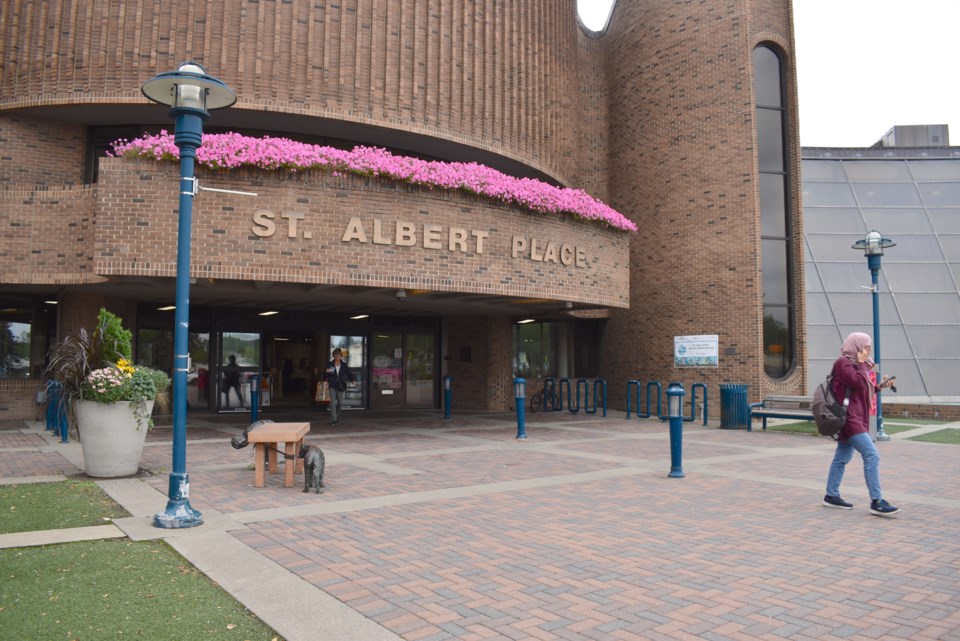The 2025 municipal election could cost St. Albert four times what the city planned for due to Alberta’s Bill 20 and its banning of vote counting machines.
Temporary workers will toil around the clock for nearly a week to hand tally ballots – four times as many as were printed in 2019 – to meet a provincial deadline after the Oct. 20 vote.
Prior to the introduction of Bill 20, the city estimated the 2025 election would cost $261,500. But hiring as many as 200 temporary workers in place of the banned machines, contracting as much as $37,000 worth of security and even $10,000 worth of staff meals will drive the cost of the election up to as much as $930,700, according to Marta Caufield, director of legal, legislative and records services.
Of that total, $535,200 will be funded from the city’s election reserve, and $395,500 will be funded from the tax base. City documents now peg the cost of Bill 20 to St. Albert at as much as $669,500.
Council also approved $100,000 in September for a temporary position to “support the significant planning required to prepare” for the election, driving the election total budget to more than $1 million.
To cover the gap, council unanimously approved the request that another $469,500 be set aside for next year’s vote, in addition to the $200,000 increase built into the draft 2025 municipal budget, which was completed before the full implication of Bill 20 was estimated out.
They also voted to increase an annual transfer to the election reserve by $157,000 to $250,000 with an eye to beefing it up ahead of the 2029 vote.
The additions mean St. Albert’s tax increase just jumped to 4.4 per cent, with 0.3 per cent attributed to the $469,500 and 0.1 per cent to the $157,000.
“You’re much nicer than I would be,” Mayor Cathy Heron said after Coun. Mike Killick read the motion in and described it as straightforward. He said he was trying to be polite.
“These are not purely operational,” she said. “These are all effects of Bill 20 … and they still have not been able to describe why.
“It is what it is.”
Council effectively rejected an option to fund the overage entirely from the election reserve fund, which current sits at $770,990.
Funding the expense mainly from the tax base delivers a message to taxpayers that the cost was created by the provincial government, according to Coun. Wes Brodhead.
“The actual outcome of Bill 20 was an increase to taxes to our people,” he said. “I think that needs to be said loud and clear.”
Coun. Natalie Joly joked there should be a line added to municipal tax bills that says “’Bill 20 Levy’ because this has a real implication to our pocketbooks.”
Colour-coded ballots
Caufield said the banning of automatic vote tabulating machines means the city plans to print three or four times as many ballots as last election, and to colour-code them for easy sorting.
Where all ballot questions were on one sheet previously, each vote will now have its own, with different colours for the race for mayor, councillors, school board trustees and any referendum questions.
This is one added cost. Others, included added security and meals, are connected to the fact that staff believe counters will have to work in shifts around the clock between the Oct. 20 election and the deadline of noon, Oct. 25 to get the results to the Ministry of Municipal Affairs.
“We actually don’t know how long it will take,” Caufield said. “It will depend on how many people we can hire … and how many people vote.”
Their plan is to have space and as many as 200 staff available until Thursday end-of-day.
St. Albert may be competing with the federal election, also scheduled for October 2025, for workers.
Inclusive of the above-mentioned increases, city staff plan to spend an additional $60,000 on advertising and promotion, the rationale being that the effort would be to get people to update their information online so the electors list the province eventually provides to St. Albert is more accurate.
“There will be a lot more changes process-wise that we want the community to get involved with,” Caufield said. “We expect more changes from the province.”
The bill for Bill 20: Cost estimates by city staff
- Contract staff (for manual counting): $280,000
- Training for manual counting and process changes: $27,500
- Creation of permanent electors register: $165,000
- Office and operating supplies (ballots, printing): $90,000
- Security: $37,000
- Food: $10,000
- Advertising & promotion: $60,000
- Total Additional Costs (Bill 20): $669,500
Source: City of St. Albert request for decision (AR-24-459).




